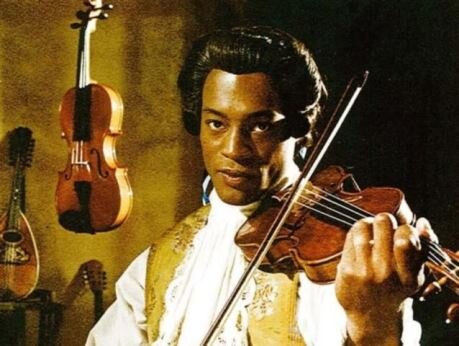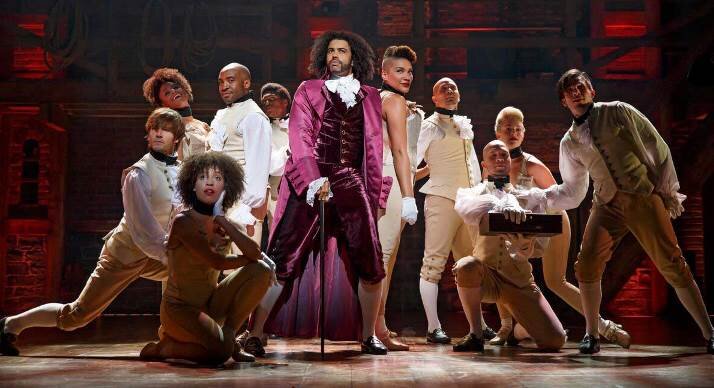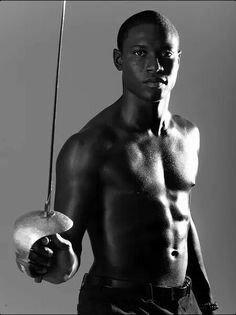Chevalier de Saint-Georges
“He could often be seen swimming across the Seine with only one arm, and in skating his skill exceeded everyone else's. As to the pistol, he rarely missed the target. In running he was reputed to be one of the leading exponents in the whole of Europe.”
Joseph Boulogne was born on a plantation, to a French commoner and an African slave on the Caribbean island of Guadeloupe in the year 1745. Now, there are roughly a half-dozen socio-economic-political-cultural-chrono-geographical details in that sentence that would, in theory, make it exceptionally difficult for Mr. Boulogne to achieve any sort of fame, success, or long-lasting feats of heroic awesomeness during his lifetime, but bullshit societal constraints meant about as much to this 18th-century badass as the unread Terms of Service document for a shitty iPhone app, and Joe Boulogne wasn’t going to choke down his pride and repress his inner badassitude just because every single human being he encountered in his entire lifetime was actively trying to force him into conformity.
And you know what? The world is better off for it. Because by the time this guy died, he was one of the most famous men in France, albeit it under his official aristocratic title and badass stage name, Le Chevalier de Saint-Georges. And even though he was a world champion fencer who sword-fought his way out of two real-life assassination attempts, defended his city from the Austrian Army during the War of the French Revolution, and commanded the first unit of black soldiers in European history, Joe Boulogne is best known as the first classical music composer of African descent – a music-writing, violin-shredding genius who played duets with Queen Marie Antoinette, ran the Paris Opera, and is known today as “The Black Mozart”…. which honestly is a serious fucking bullshit nickname because this guy pre-dates Wolfgang Amadeus Mozart by more than a decade.
But let’s start at the beginning. Joseph Boulogne was born in the then-French colony of Guadeloupe in 1745. His dad was a French commoner who had come to the island to build a plantation, and ended up marrying one of his slaves, getting awarded some sort of title of minor nobility, and then was forced to flee the island because he totally might have murdered a guy in a swordfight. So, when Joseph was seven years old, he left Guadeloupe with his mom and dad and sailed to Bordeaux, France. When he turned 13, Boulogne was enrolled in what has to be among the most badass schools ever, being accepted to Boëssière’s Academy of Fencing and Horsemanship, which I imagine to be like the ITT Tech of shanking faces from horseback. He almost immediately started working on his Master’s Degree in Fucking Shit Up, and at the age of 15 he was already kicking his teachers’ asses in fencing duels. By 17 he is described as having “the greatest speed imaginable,” slicing and stabbing with a cool Zorro-style rapier and beating ass at a time when pretty much everyone still fought with a sword as their primary weapon… being the greatest fencer in France in 1762 is more like starting at Striker for Real Madrid than it is like winning a lame old-timey bicycle race in 2015. Oh, and when this guy wasn’t kicking ass in fencing demonstrations in front of thousands of cheering fans, he was also a champion runner and pistol marksman, and he like to train his cardio by swimming across the Seine while only using one arm.
Because Joseph Boulogne was partly of African descent, he was basically forbidden by French law from participating in anything cool or exciting, but this guy rarely seemed to give a shit about any of that. He also refused to let motherfuckers step to him or talk shit about him because of his heritage. Like, one time a the fencing master from a rival school in Rouen started throwing shade on Boulogne, referring to him as “Boëssière’s mullato,” so Boulogne challenged that asshole to a showdown. Boulogne was by far the most accomplished student at his academy, but now he found himself in a duel with fencing master Alexandre Picard, the guy who was the friggin’ head instructor at a rival school. The duel was attended by hundreds of people from across France. The hype got so big for it that at one point it ended up being billed as a demonstration of whether or not France should consider outlawing slavery. I’m sure that didn’t add any pressure or anything.
Joseph Boulogne beat that guy’s sack off. He went on to graduate the Academy, accept a position in the King’s Royal Guard, and was knighted Le Chevalier de Saint-Georges (“The Knight of St. George), which is super damn impressive because people of African descent weren’t technically allowed to be knighted or hold cool titles like that (but whatever). The fencing school hung his portrait and his swords up in their main fighting hall.
After leaving the Academy, Saint-Georges partied his ass off in Bordeaux, attending balls, fighting in demonstrations, and attending concerts and operas. Then, in an insanely awesome turn of events, all of a sudden in 1764 this guy started playing insane violin jams that blew everyone’s faces off and sent them flying to the back of the auditorium. Before 1764, nobody had any idea he could play. There’s no record of him having any training, or ever playing before. Then, at the age of 19, all of a sudden this guy fucking shreds. It’s like a fucking Disney movie where all of a sudden everyone breaks out in song and you’re like, “wait, what the hell is going on here?”
Chevalier de Saint-Georges becomes like the friggin’ Jimi Hendrix of 18th century France. He dresses up in these insane, cutting-edge, silver-trimmed courtier clothes, jams a bunch of badass songs that he wrote himself, and “was appreciated not as much for his compositions as for his performances, enrapturing especially the feminine members of his audience.” He writes string quartets, concertos, sonatas, and a bunch of other words that basically all mean “badass classical jam”, plays all the violin solos himself (improvising most of them on the spot), and then bangs a bunch of groupies (a French noblewoman was not allowed to marry someone of African descent, but by all accounts this did not stop them from sleeping with him all the time). Hell, on more than on occasion, Queen Marie Antoinette herself was said to have disguised herself as a regular noblewoman so she could attend his shows, and later on in his career he even played in a string quartet with her.
Saint-Georges became a superstar in France for his performances with both sword and violin, and when he wasn’t serving in the King’s Guard he was writing operas, managing a concert hall, and even commissioning new original work from famous contemporary composers like Joseph Haydn. Eventually he was tapped to run the Paris Opera, but a bunch of divas (literally, they are called divas, I’m not just throwing shade here) decided they didn’t want to work for a “mulatto”, and even though the King and Queen told those biznatches to deal with it, Saint-Georges said fuck this shit and went to chill in London for a while. While he was there he ate dinner with the Prince of Wales, gave a speech to Parliament about why England should abolish slavery, and trained with the greatest fencing masters in the UK. At one point he was walking home, and some guy jumped out with a gun, demanding Saint-George’s wallet. Saint-George fucking snatched that gun right out of the assholes hand, but then, out of the shadows, four more dudes stepped up, swords at the ready. It was pretty clear all of a sudden that this wasn’t a mugging – this was an assassination attempt by pro-slavery douchebags.
Well this wasn’t even the first time Saint-Georges had been jumped by a group of would-be murderers. The first time, in Paris, the cops had arrived just in time to find Saint-Georges choking the shit out of one of his assailants. This time, in London, all they found was a pile of unconscious and wounded bodies. He had, in the words of a witness, “put them all out of commission”.
Chevalier de Saint-Georges eventually went back to France, settling in the town of Lille on the Dutch border. He then proceeded to win the city fencing tournament, defeating most of the men in the town guard, and as soon as he’d won he passed out into a four-day coma because he’d fought the entire tournament while running a fever and suffering from meningitis. He recovered, enlisted in the French National Guard, played concerts every weekend, and fought against Austria in the Battle of Baisieux.
When the Wars of the French Revolution began around 1792, the Chevalier de Saint-Georges was promoted from Captain to Colonel and was given command of the “Legion de Saint-Georges,” a group of soldiers who had been recruited from the French province of Saint-Domingue (present-day Haiti). It was the first all-black unit to ever serve in a European army, and the Colonel Chevalier de Saint-Georges led them with distinction in battles throughout Holland. At one point, the Legion even thwarted an attempt by a famous French general to turn traitor against the Revolution and capture Lille for Austria.
As a fairly awesome side note, the Legion de Saint-Georges’ second-in-command was a Lieutenant-Colonel named Thomas-Alexandre Dumas, better known as “The Black Devil”. Lt. Col. Dumas is badass in his own right (I will write about him on this site at some point), and his son is the guy who wrote The Three Musketeers and The Count of Monte Cristo.
“The Black Devil” in battle
Despite staying true to the French Revolution (the revolutionary motto “liberty, equality, fraternity” was something he could totally get on board with), the Chevalier de Saint-Georges was arrested during the Terror, probably because he’d been friends with the Queen and had spent a lot of time with the aristocracy. He was imprisoned for 13 months before being released. He was never actually charged with a crime.
After getting out of jail, Saint-Georges may have gone to Haiti with some of his former men to help battle against Toussaint L’Ouverture (this has never been confirmed), but eventually settled back down and went back to his musical career. He continued to write, produce music, and play shows, once again becoming a famous household name throughout France. He died in 1799 at the age of 53.






